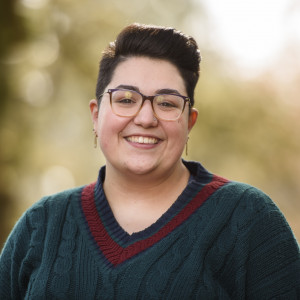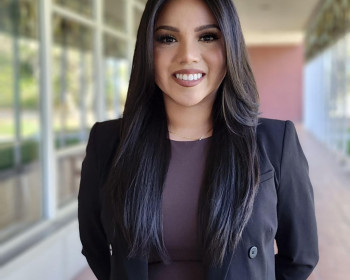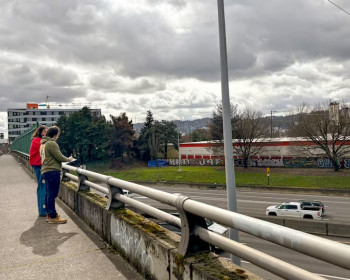Rhianna Camacho
Secondary Science Education, MAT ’22
(they/she)
After spending time teaching and volunteering in outdoor education, Rhianna Camacho felt pulled to educate younger generations and to lead them through science in a way that made sense to them.

“I didn’t consider becoming a teacher until I spent time volunteering and working in outdoor education,” says Camacho. “I felt like there was a calling for me to educate younger generations and to lead them through science in a way that makes sense to them.”
Identifying as a “queer, nonbinary, person of color” and someone who is “feminine presenting in the world of STEM,” Camacho shares that finding an institution that aligned with their values was a top priority. Ultimately, Lewis & Clark’s firm commitment to social justice and the integration of equitable practices into all aspects of education confirmed for Camacho that this was the right place for them to be. The almost familial relationships with her cohort and faculty have also been vital to Camacho’s success.
The people have absolutely been the best part of this program! All of the relationships I cultivated with my professors have been nothing but positive, and being a part of a cohort has really helped me both academically and socially. I have made lifelong friends, and it is really helpful going through this program knowing that you are not alone.”
This “climate of love,” as Camacho calls it, was both the inspiration and support behind their academic and field-based success. They note that it is easy to be passionate about your work when you are surrounded by a cohort of equally dedicated scholars, and that education is a field where passion can be alchemized into something greater when teaching students about the world that surrounds them.
“During the practicum I was able to actively witness my students engaged in science content. Seeing my students excited about learning made me excited to teach! They recently completed a lab modeling cell membrane functions through playing with bubbles, and just seeing how excited they were made me eager for new labs and lessons to come!”
As Camacho prepares to enter the field professionally, they feel more confident than ever in their work, trajectory, and mission.
I hope to be forever learning how I can change my teaching and pedagogy to promote social justice in the science classroom. I plan to make units that students care about and that are enveloped in relatable social justice issues that inspire discussion and inquiry. I want to be the kind of teacher that is able to make change within their students and how they view the world.”
Camacho also turns towards the incoming cohort of educators with some advice. They urge new students “not to take this opportunity for granted, and to be nicer to yourself. There is not enough time in the day (and in your life) to doubt your skills or focus on what you are doing wrong. You are worth so much more than you think, and you should believe in yourself.”

